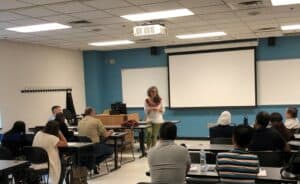CSA is beginning a new series on Business & Justice with series editor Dorcas Cheng-Tozun. As you’ll see in this series, the work of justice is very much happening in the business sector through new technologies and creative business models and through cutting-edge design and savvy distribution. The business leaders you will hear from are building companies that are kingdom-centered and justice-oriented. In these businesses, creativity, generosity, and collaboration thrive, moving us closer to a more equitable distribution of resources and opportunities. Their work truly honors God’s call for us to contribute to the redemption of this planet, and it gives us great hope.
 Today, we welcome Louise Wasilewski, CEO and co-founder of Acivilate, a social enterprise providing rehabilitation software to justice, health, and human services agencies. Pokket helps justice agencies work with human services agencies to improve outcomes for vulnerable people by empowering them to help themselves and find the support services they need. Louise has spent 25 years in technology innovation and is passionate about improving criminal justice outcomes.
Today, we welcome Louise Wasilewski, CEO and co-founder of Acivilate, a social enterprise providing rehabilitation software to justice, health, and human services agencies. Pokket helps justice agencies work with human services agencies to improve outcomes for vulnerable people by empowering them to help themselves and find the support services they need. Louise has spent 25 years in technology innovation and is passionate about improving criminal justice outcomes.
If you were to ask me in a business setting what Acivilate is, I’d say we’re a company dedicated to transforming second chances for people leaving prison, women leaving domestic violence, and those struggling with homelessness. We do so by equipping the case workers who help those marginalized people with technology.
But if you asked me what Acivilate means to me, I’d say it is an opportunity I never expected to have. It’s an opportunity to do something about a problem I have pondered since I was a teenager.
When I was 14, my father was arrested for a white-collar crime. That night I gave my life to Christ, because my “good” stepdad had seemingly let me down after my “bad” birth father had run off. But God promises to be our Father who will never leave us. So I thought I’d give God a try.
My family experienced the social and economic consequences of justice-involvement, even though my dad was never incarcerated. He only got probation. But he lost his job and couldn’t get hired again for regular work. I saw the loss of dignity he experienced from not being able to support his family and the strain it put on my stay-at-home mom to become the breadwinner.
I’d always wondered how I could help other people like my dad and other kids like me. But, as an immigrant to America, I had no social network or financial means.
Entrepreneur Charlie Goetz, my MBA professor at Emory University, helped me believe I could make a difference. Most people left his class thinking entrepreneurship was too demanding. For me, it became possible.
My first idea was to start a nonprofit to teach inmates to write software, and then run a for-profit consulting company offering them apprenticeships when they were released. This idea unraveled when I learned what a low education level most people in the justice system have. I stuck with my core question—how to create second chances?—and started asking people who had been through the system about their challenges. I also talked to the professionals helping those people: probation officers, social workers, and more. They each described a system so remarkably broken—for everyone.
Everyone in the U.S. justice system is overwhelmed. Caseworkers don’t have the information they need to do a good job. Probation officers spend so much time on box-checking paperwork that they don’t have time to help. But it’s the lowest-educated individuals, the returning citizens themselves, who have to figure out how to do what their different counselors want: the workforce person helping them get jobs, the housing counselor helping them find permanent places to live, the behavioral health counselor helping with their substance or mental health issues. There are also the individuals with no case management system.
Our platform, Pokket, is designed to be a case management system for the subject of the case. It restores agency to someone who had all agency removed in prison. It provides control over their privacy, after having every piece of mail scanned by a stranger or machine. It enables the returning citizen to organize everything they have to do, so they aren’t so overwhelmed. It prevents the loss of paperwork if they move from shelter to shelter. Clients can submit information with their own or a family member’s smartphone or a library computer. Medicaid-funded smartphones might not be sophisticated, but they can handle our simple application. Being able to show up with their act together restores their dignity and makes their interactions with caseworkers easier.
Christian ethnographer Tex Sample’s model of relationships between clients and professionals helped guide our design process: There are people who do things to you; being imprisoned is done to you. Then there are people who do things for you, like a counselor who transactionally finds you a place to live. But good casework is done with clients, where they have input and some agency.
With Pokket, we seek to enable a transition over time, moving individuals from done for me to done with me to done by myself. When clients learn to manage their own affairs, plan their lives, and make better decisions, they become self-sufficient. That’s the ultimate goal. If people don’t learn to make better decisions, they’ll end up right back in a needy situation—afraid, vulnerable, hurt, and potentially hurting others.
Pokket is a bridge between clients and caseworkers, and, indirectly, a bridge between caseworkers. The idea came from simply listening to people’s challenges in a non-traditional way. We would talk to someone like Wilfred, a young man with a will to be free. What does Wilfred need? Software alone won’t change the life of most justice-involved people. Instead, we seek to enable better relationships between clients and staff. And that includes with a mentor, who, more often than not, comes from a church. One of our partners is Pastor Lee Robbins of The Source Church and his Tackle the Shackles ministry. His team provides free life coaches to returning citizens anywhere in the country to help them navigate re-entry. They communicate through Pokket.
Previously, nobody cared how hard it was for the returning citizen. Attention was paid only to the plight of caseworkers. Then the COVID-19 pandemic hit, and it quickly became clear that clients had been doing a ton of work, carrying information on paper from one place to another. When face-to-face meetings stopped, the whole human services system stalled. One metro-Atlanta housing provider reported having over 90 beds vacant—three-quarters of the beds in their facility—because they couldn’t connect with people who needed housing.
As a result, agencies have become a lot more interested in how information flows or stops. This has led to new interest in how our empowerment model makes it possible for different agencies to work together to serve individuals. A county we recently started working with is connecting the jail system with the department of public health, the county workforce agency, community housing providers, and mentors. Today, Acivilate is serving thousands of people in over half a dozen states, and those programs are expanding.
The first time I heard about a client who completed probation and asked to keep Pokket because it was so useful, my heart sang. This young adult had gotten help navigating the adult world from her probation officer, leading to a job, hope, and some stability. She didn’t want to lose that relationship, which was embodied in the app. Probation officers have told me that the more they use Pokket, the more their clients use it. When an officer invests in the relationship, clients return that investment.
Matthew 25 calls us to serve the prisoners. In Scriptures, many people of faith, including Jesus, Paul, Joseph, and Jeremiah were imprisoned. As an engineer, I may not be a natural counselor, but I can bring to bear my technological skills to make it easier for people-oriented individuals to connect with those who most need someone to walk alongside them in life. Christians are called to restoration, and, at Acivilate, we make it easier to reach across the aisle, across town, and even across the country to do just that.
 Series editor: Dorcas Cheng-Tozun is an award-winning writer, editor, communications consultant, and the author of two books on entrepreneurship. She previously served as the first director of communications for leading social enterprise d.light, which has provided solar-powered solutions to more than 125 million people with no or limited access to electricity. Her business writing has appeared in Inc.com, Christianity Today, Unreasonable, BlogHer, Grit & Virtue, and more. Dorcas currently serves as the editorial director of Made for PAX. Her next book, Social Justice for the Sensitive Soul, will be released in 2023. Connect with her at chengtozun.com.
Series editor: Dorcas Cheng-Tozun is an award-winning writer, editor, communications consultant, and the author of two books on entrepreneurship. She previously served as the first director of communications for leading social enterprise d.light, which has provided solar-powered solutions to more than 125 million people with no or limited access to electricity. Her business writing has appeared in Inc.com, Christianity Today, Unreasonable, BlogHer, Grit & Virtue, and more. Dorcas currently serves as the editorial director of Made for PAX. Her next book, Social Justice for the Sensitive Soul, will be released in 2023. Connect with her at chengtozun.com.


